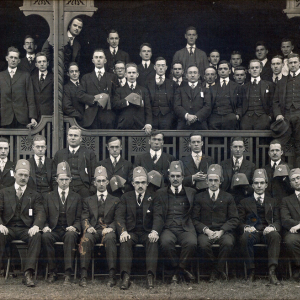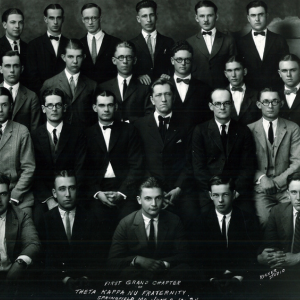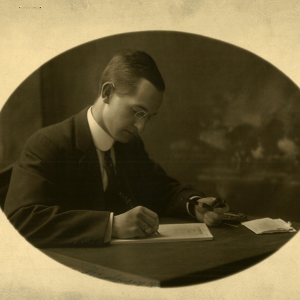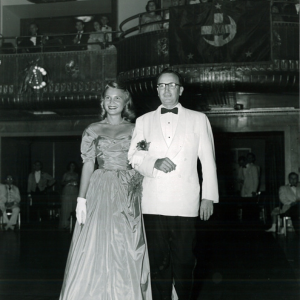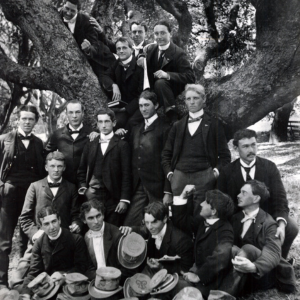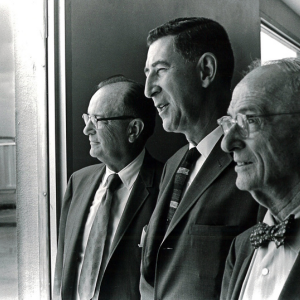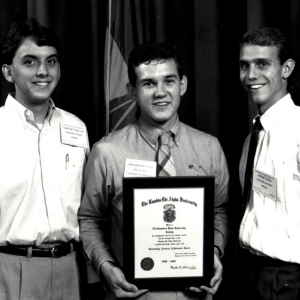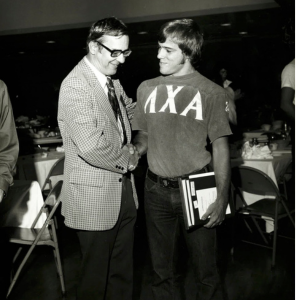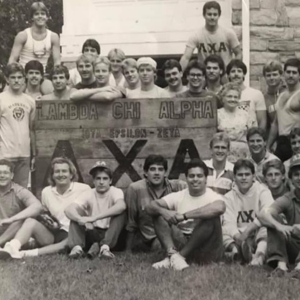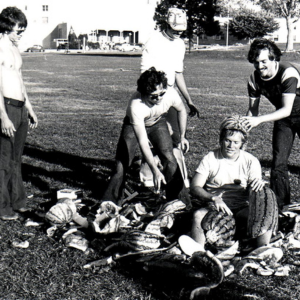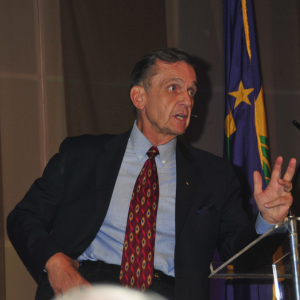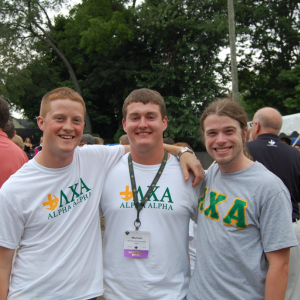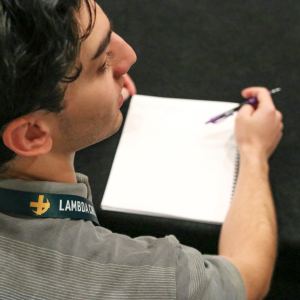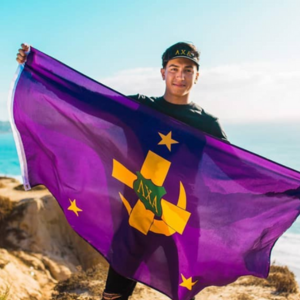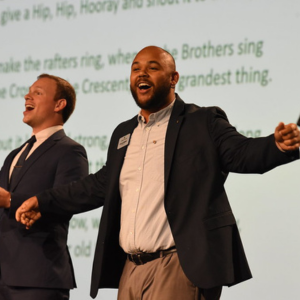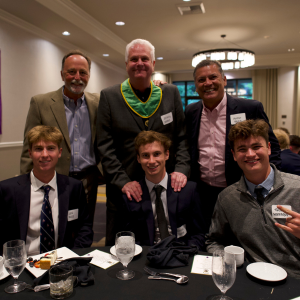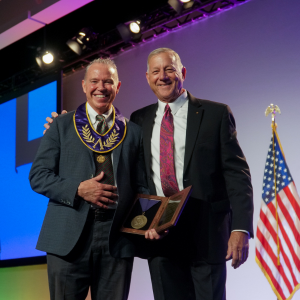1905
Cosmopolitan Law Club organized at Boston University.
1909
November 2—Warren A. Cole (Boston 1912) founded Alpha Zeta of Lambda Chi Alpha at Boston University. As an incoming law student at the university, it was Cole’s dream to start a college fraternity from the very beginning. After graduating with a Bachelor of Law degree, Cole set out to build Lambda Chi Alpha into an international fraternity and served as the first Grand High Alpha, or chairman, until December 1919. He also served as the administrative secretary and editor of the Purple, Green, and Gold magazine.
1910
April 27—The Fraternity’s name, Lambda Chi Alpha, is written and recorded for first time in Alpha Zeta minutes and the first Zeta roll, which served as the official membership records for all Chapters.
October 3—The first version of an Initiation Ritual is held.
1911
November 15—Date of Alpha Zeta Charter. First Grand High Zeta elected.
November 23—Alpha Zeta members agreed to issue themselves a charter as the first installed Chapter of Lambda Chi Alpha. (The charter was dated November 15.)
1912
January 10—First expansion committee appointed. (This marked first step in expansion program.)
February 12—Fraternity’s first quarters obtained at 16 Westlake Avenue, Boston.
April 13—The First General Assembly was held in Boston, which established the governance of the organization and adopted general and expansion policies for the Fraternity.
May 18—First petition for a charter is approved and the group of students at Massachusetts Agricultural College, later known as the University of Massachusetts Amherst, becomes the second installed chapter of Lambda Chi Alpha.
1913
March 22—The Second General Assembly is held in Boston, where membership restrictions were adopted; moral clauses were incorporated in the Constitution; pledge instruction was first considered; Board of Publications was established, and the foundation was laid for a new Initiation Ritual — unable to attend, John “Jack” Mason (Pennsylvania 1913) stayed up all night and wrote a seven-page, handwritten letter about his vision of what the ideals and of Lambda Chi Alpha should be and how they should be expressed. This historic letter was read to the assembled body and was significant in the adoption of a new Initiation Ritual for the young Fraternity. Today, Dr. John E. Mason is known as the spiritual founder and the chief architect of the Initiation Ritual of Lambda Chi Alpha.
1914
January—No. 1, Vol. I, of the Purple, Green, and Gold magazine appeared.
April 9—The present Initiation Ritual of Lambda Chi Alpha is adopted by the Third General Assembly in Worcester, MA.
1915
January 2—Vol. I, No. I, of Cross & Crescent handbook appeared.
February—Zeta Zephyr is the first chapter publication, published by Zeta Zeta at Penn State.
1917
Twenty-five hundred Lambda Chis (90 percent of membership) in war service. Six Zetas wholly inactive because of enlistments.
1919
December 31—Ernst J.C. Fischer (Cornell 1910) is elected the second Grand High Alpha at Ann Arbor General Assembly. Fischer was instrumental in the establishment of the general endowment fund which would prove to be critical to Lambda Chi Alpha during the Great Depression. Warren A. Cole resigned from Lambda Chi Alpha shortly after the meeting.
1920
February 12—Bruce McIntosh (DePauw 1916) is appointed the first full-time administrative secretary of Lambda Chi Alpha, known today as the chief executive officer, and was operating the central office out of Fischer’s home in Kingston, Pennsylvania. Bruce was instrumental in the union with Theta Kappa Nu Fraternity. Thanks to his skillful management, creative talent, vision and dedication, the Fraternity was able to progress rapidly. Bruce is a founding member of the College Fraternity Secretaries Association, now known as the Fraternity Executive Association.
December 15—The central office moved to Indianapolis, Indiana.
1924
June 9—Delegates from 11 local societies convened at Springfield, Missouri, and formed Theta Kappa Nu Fraternity.
September 1—J. Fred Speer (Pennsylvania 1922) is hired as the first traveling secretary (later known as an Educational Leadership Consultant or ELC) who devotes full time work to Chapter visitation.
October 7—Lambda Chi Alpha Fraternity becomes incorporated.
1926
Summer—The first edition of The Paedagogus, the official membership handbook, is published to replace the Cross & Crescent handbook.
1927
December 3—Lambda Chi Alpha becomes an international fraternity with the installation of Epsilon-Epsilon Zeta at the University of Toronto in Canada. The practice of hazing is openly condemned by Bruce McIntosh at an NIC meeting.
1932
January 1—The Purple, Green, and Gold magazine changes its name to the Cross & Crescent magazine.
July—Bruce H. McIntosh becomes president of the Fraternity Executives Association. A central figure in its founding, he is the only one to have served two terms as its head.
1935
September 3—Established in 1933, the Order of Merit inducts its first members at the General Assembly. This recognition was created to recognized alumni volunteers for unusual, lengthy, and dedicated service to the Fraternity — particularly at the local chapter level.
1939
October 11—A ceremony is held at the Howard College, now Samford University in Birmingham, Alabama, to officially mark the union of Theta Kappa Nu Fraternity with Lambda Chi Alpha. This increased the Chapter roll from 77 to 111 and membership from 20,000 to 27,500, becoming the largest union in the fraternity world. TKN’s heritage was honored in this united fraternity by adding the Latin open motto Vir Quisque Vir, meaning “Every man a man”, and other additions to the fraternity’s coat of arms; the white tudor rose becoming the Fraternity’s official flower; a new pledge pin design and later the Associate Member Ceremony (a condensed version of TKN’s ritual).
1940
March 1—The General Fraternity purchases it’s first Office of Administration building, a remodeled home at 2029 N. Meridian Street in Indianapolis. On October 15, offices moved to new building.
1943
Cyril F. “Duke” Flad (Wittenberg 1940) succeeds Bruce McIntosh as administrative secretary of Lambda Chi Alpha. A Brother from one of the former Theta Kappa Nu chapters, Duke Flad joined staff as a traveling secretary and served as office manger before he was named the new administrative secretary. For 25 years, Duke Flad served as the chief executive until his death in 1968.
1944
Leroy Wilson (Rose-Hulman 1922), former Grand Archon of Theta Kappa Nu, becomes the first Lambda Chi Alpha brother to head the National Inter-fraternity Conference, known today as the North-American Inter-fraternity Conference (NIC). An estimated 13,000 members serve in the armed forces during World War II; more than 400 die. Forty-nine of the 129 Chapters are inactive due to military service.
1946
June 1—The Dr. John E. Mason Memorial Foundation (now Lambda Chi Alpha Educational Foundation, Inc.) is created from his bequest upon his death on May 29th. While Mason’s name is closely associated with ritualism of Lambda Chi Alpha, he also contributed extensively in many areas, such as assisting in the development of the first edition of The Pedagogues and songbook, as well as serving many years as the Fraternity’s historian and member of the Grand High Zeta, including Grand High Alpha from 1930-1933.
1949
August 22—The first Management Training Seminar (now Stead Leadership Seminar) is held at Wittenberg College in Springfield, Ohio.
1953
The Annual Fund campaign is established as a means for Alumni to financially support the Fraternity beyond their college days.
August 31—The position of Chapter services secretary (now director of Chapter services) is created. George W. Spasyk (Michigan 1949) is the first to be hired in this position after serving as a traveling secretary since 1950.
1955
Duke Flad oversaw the move to the second and more spacious Office of Administration building at 3434 Washington Boulevard in Indianapolis. That same year, Duke Flad is elected president of the Fraternity Executive Association and his title of administrative secretary is changed to executive director.
1957
Founding Father Warren A. Cole is reinstated as a member in good standing.
1959
October 30—Fiftieth anniversary rededication ceremonies are held in Boston.
1960
August 21—The first Members are inducted into the Order of Achievement and Order of Inter-fraternity Service. The Order of Achievement is presented to those brothers of Lambda Chi Alpha who have distinguished themselves by outstanding accomplishment in their chosen field and serve as a role model through their success and have thereby brought honor and respect to the Fraternity. The Order of Inter-fraternity Service was created to recognize those men and women who have contributed outstanding service in the betterment of all college fraternal organizations.
1961
Upsilon Zeta at Louisiana State becomes the first Chapter to initiate 1,000 members.
1967
Dan Dullaghan (Butler 1970) is initiated as Lambda Chi Alpha’s 100,000th member, the fifth fraternity to do so.
1968
After Duke Flad’s death, George W. Spasyk is named the third chief executive and became the new executive director of Lambda Chi Alpha.
December 28—Founding Father Warren A. Cole passed away and is buried in a family plot at a cemetery in Rehoboth, Massachusetts.
1969
August—The concept of fraternity education was introduced in Lambda Chi Alpha with a small number of Chapters implementing this concept.
August 31—The first Regional High Pi Conference is held.
1970
June 5—The first meeting of what was to become the Student Advisory Committee is held in Indianapolis.
September 1—The first Undergraduate Member, Brad Peabody (Sewanee 1971), is elected to the Grand High Zeta. A Resolution is adopted by the 32nd General Assembly that condemns all forms of discrimination in all chapters. Fred W. Suggs, Jr. (Kansas State 1971), who later served as Grand High Alpha from 1994-1998, is the first recipient of the Cyril F. “Duke” Flad Outstanding Undergraduate award. This award was created to honor Duke Flad and recognize one outstanding undergraduate from among all student Members annually.
1971
Linn C. Lightner (Franklin & Marshall 1918) retired after 50 years of service as editor of the Cross & Crescent
1972
At the 33rd General Assembly, legislation is passed for the adoption of associate membership and fraternity education throughout Lambda Chi Alpha. The term “associate member” replaces the term “pledge” when referring to a new member. Associate membership allows new members voting rights in Chapter matters and the ability to run for officer positions, unlike other fraternities at the time. Lambda Chi Alpha is the first fraternity to abolish pledging to promote an anti-hazing culture in its Chapters.
1973
August—The first Grand High Alpha Awards and Phoenix Awards are presented. The Grand High Alpha award recognizes Chapters that have maintained a superior level of operations for at least three consecutive years. A Chapter is not eligible to receive the Grand High Alpha again until three years have elapsed since previously winning the award. The Phoenix Award is presented to a Chapter that has made unusually positive strides in overall Chapter operations for at least three consecutive years, taking into consideration improvement in membership size, enhancement of programming, and incident-free operations.
1974
June 15—The third Office of Administration building is dedicated in northwest Indianapolis at 8741 Founders Road.
1983
August—The Standards for Chapter Excellence Program is introduced at the Leadership Seminar at Ball State in Muncie, Indiana.
1984
Numerous Founders Day and other commemorative events are conducted in celebration of Lambda Chi Alpha’s 75th anniversary.
1985
August—The first McIntosh Awards are presented to the chapters that successfully implement the Standards for Excellence program.
1988
Mandatory Resolutions are adopted by the 42nd General Assembly that eliminates the use of alcoholic beverages during the recruitment process and prohibits chapters from purchasing or providing alcohol during events, eliminates entirely any and all hazing practices and to continue to implement positive and constructive educational programs, and condemns deliberate or repeated offensive comments, gestures or contact of a sexual nature, date rape, and any other form of sexual violence or harassment.
1989
Title of executive director is changed to executive vice president.
1990
June 30—George W. Spasyk (Michigan 1949) retires as executive vice president following 40 years of service on the Administrative Staff, and was designated Executive Vice President Emeritus by the Grand High Zeta. Among his accomplishments during his 22 years as chief executive was the implementation of associate membership that replaced pledgeship in Lambda Chi Alpha and promoted an anti-hazing culture in the entire fraternity and sorority community. Spasyk is succeeded by Thomas A. Helmbock (Evansville 1970) who becomes the Fraternity’s fourth full-time chief executive.
August—The position of High Iota (risk manager) is adopted by the 43rd General Assembly, the first fraternity to create a risk management officer in every Chapter.
1991
August—Lambda Chi Alpha initiates its 200,000th member, the third fraternity to do so.
1993
Omega Zeta at Auburn becomes the first chapter to initiate 2,000 members.
November—Lambda Chi Alpha sponsors the inaugural North American Food Drive, the largest single-day Fraternity philanthropic project, and raises more than 256,000 pounds of food for the hungry.The Lambda Chi Alpha Educational Foundation of Canada is created.
1995
July—The General Fraternity is presented with the Summit Award from the American Society of Association Executives for its 1994 Brothers Feeding Others North American Food Drive efforts, becoming the first fraternity ever to receive this honor.
November—The totals of the third annual North American Food Drive exceed 550,000 pounds of food, making it the largest single-day community service event of any student organization
1996
August—The LEAP program is introduced at Leadership Academy prior to the General Assembly in Dallas. It recognizes a commitment among our members to Lead by Example And Precept by attending one of four seminar levels designed to enhance a member’s leadership skills. The 46th General Assembly in Dallas adds two new positions to the Grand High Zeta. The ruling allows the 10 elected Board members to recruit two additional men for the newly created two-year terms, holding the director positions of Grand High Epsilon and Grand High Rho.
1997
November—North American Food Drive totals reach more than one million pounds. Over the years, The North American Food Drive touches the lives of more and more community members each year.
1999
LEAP evolves into Impact Leadership, a program that supplements leadership training with interpersonal communication skills.
November—North American Food Drive totals reach more than two million pounds.
2001
September 11—When the World Trade Center and Pentagon were attacked, nine brothers lost their lives:
- Donald A. Delapenha (Baldwin-Wallace)
- Chris M. Dincuff (Villanova)
- Michael E. Gould (Villanova)
- Robert D. W. Higley (Connecticut)
- Todd R. Hill (Massachusetts)
- Robert Hymel (Louisiana-Lafayette)
- Justin J. Molisani Jr. (Lycoming)
- Jerrold H. Paskins (Nebraska-Omaha)
- Christopher J. Vialonga (Susquehanna)
The Joseph T. Charles Mentor Leadership Program is unveiled. The program was designed to create and provide a link for undergraduate members to their future through advice and coaching from alumni of distinction in their chosen professional career path.
November—North American Food Drive totals reach more than three million pounds.
2002
The Chapter office of High Theta was established at the 49th General Assembly. The Order of Interfraternity Service award was renamed “The George Spasyk Order of Interfraternity Service”, to honor and recognize Executive Vice President Emeritus George Spasyk for his 40 years of service and commitment to Lambda Chi Alpha, as well as the entire interfraternity world.
2004
July—The Council of Presidents is officially created. The primary roles of the Council of Presidents are to help foster communication between High Alphas and coordinate the proposal of future legislation.
2005
June—William T. Farkas (Butler 1988) becomes Lambda Chi Alpha’s executive vice president after Tom Helmbock’s retirement. He is the Fraternity’s fifth full-time chief executive.
July—The comprehensive multi faceted Alumni Adviser’s College is offered at the Leadership Seminar at the University of Maryland. It marks the adoption of a training structure that intends to elevate the role of Chapter Adviser to a truly educated mentor and guide for the Undergraduate Brothers.
August—The Grand High Zeta approves the implementation of the Shine the Badge campaign, a multi-year endeavor to bring attention to the Fraternity’s Minimum Operating Standards and holding all chapters and colonies to these standards.
2006
March—Grand High Kappa Drew Hunter (Denver 1984) conducts a retreat in Denver Colorado to bring to fruition a plan that addresses concerns many brothers shared about a need for a new, comprehensive development program focused on a brother’s entire journey in Lambda Chi Alpha — from recruitment to lifelong alumnus. Grand High Alpha Dr. Ed Leonard (William Jewell 1979) announces the Grand High Alpha Challenge acknowledging chapters who achieve seven goals: recruitment and retention, ritualism; scholarship; campus involvement; attendance at conferences; and implementation of the Outer Circle programming.
2007
January—True Brother is unanimously approved by the Grand High Zeta and Executive Vice President for implementation as the comprehensive values based programming for Lambda Chi Alpha.
July—The Leadership Seminar is dedicated to Brother Jerre Stead and his wife, Mary Joy, for their belief in the benefit of values-based education. The True Brother Initiative is introduced to the entire brotherhood at the Stead Leadership Seminar in Memphis.
2008
July—At the 52nd General Assembly in Phoenix, Executive Vice President Bill Farkas kicks off Lambda Chi Alpha Centennial Celebration that continues through the fall of 2009. Throughout the 2008-2009 academic year, several regional events are held across North America to celebrate a century of true Brotherhood.
2009
Approximately 1,000 brothers and guests attend the International Centennial Celebration held on July 31, 2009, at the Scottish Rite Cathedral in downtown Indianapolis.
November 2—Centennial Celebration concluded with a small gathering of Alumni and Undergraduates in Boston to celebrate and pay respect to those involved in making Lambda Chi Alpha so great and to mark the beginning of the Fraternity’s second century.
2010
January—Board hosts five college presidents to discuss how Lambda Chi Alpha can better partner with host institutions.
July—Lambda Chi Alpha selected to present at NASPA and ACPA, the premier conferences for senior student affairs professionals.
2011
The Educational Foundation announces a $20 Million Capital Campaign called the “Future Leaders Campaign” to assist with Chapter programming, alumni outreach and many others.
2012
January—The Grand High Zeta approves a title change for the Executive Vice President to Chief Executive Officer.
2013
July 29—Lambda Chi Alpha and Feeding America formally announced a new national partnership designed to improve the fraternity’s food collection programs on college campuses. Feeding America is a nationwide network of more than 200 food banks that leads the fight against hunger in the United States.
2014
The Council of Presidents is officially disbanded.
July—Lambda Chi Alpha launched Officer Academy (OA), an online officer training and transitioning program. This program provides officers with modules that educate them about their roles and responsibilities, as well as about Lambda Chi Alpha policies and procedures.
August—The Office of Administration relocated to Carmel, IN (north suburban city of Indianapolis)
2015
January—The inaugural High Alpha Summit is held in Washington DC with over 100 attendees present. The High Alpha Summit is a three-day conference where High Alphas learn the fundamentals of serving as chief executive officer for their respective Chapter, with emphasis on leadership, ethics, operations management, external relations and harm reduction.
2016
Since partnering with Feeding America, Lambda Chi Alpha Chapters and have collected over 10 million pounds of food.
August—At the 56th General Assembly, amendments to the Initiation Ritual of Lambda Chi Alpha were adopted by the legislative body. This was the first time the Fraternity’s Initiation Ritual has been amended since 1985.
2018
25th Grand High Alpha: Jeffrey A. Stuerman (Culver-Stockton)
2019
Troy L. Medley becomes the 6th CEO of Lambda Chi Alpha. Dan Hartmann is introduced as the CEO of the Educational Foundation. The Farkas Fellow internships are created.
2020
Lambda Chi Alpha reaches 300,000 Members.
2021
The Office of Administration moves to its current location at 10 W. Carmel Dr. The first ever virtual General Assembly is held due to the COVID-19 pandemic.
2022
The Lambda Chi Alpha General Fraternity officially partners with Movember. 26th Grand High Alpha Steve L. Pattison (Florida State)
2023
The Lambda Chi Alpha General Fraternity officially partners with the American Red Cross. Lambda Chi Academy was introduced. Capt. Larry T. Taylor is the third Brother to be awarded the Medal of Honor (first one since the 1940s). The first Regional Chapter is chartered in San Diego, California.
2024
The Chapter Challenge, a real-life simulation of what it’s like to run a Chapter, is unveiled at the 2024 High Alpha Summit. The 60th General Assembly and Stead Leadership Seminar is held in Scottsdale, Arizona. Lambda Chi Alpha celebrates 115 years of Brotherhood.

